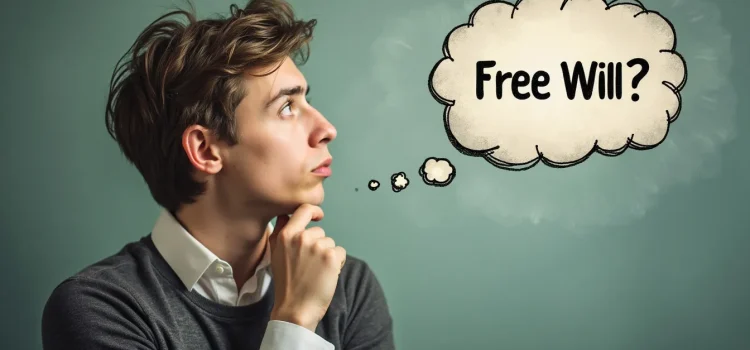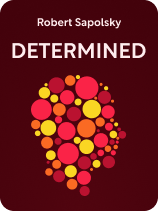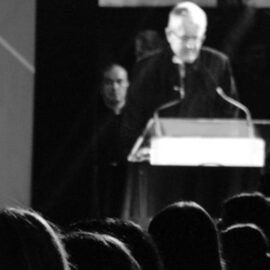

This article is an excerpt from the Shortform book guide to "Determined" by Robert Sapolsky. Shortform has the world's best summaries and analyses of books you should be reading.
Like this article? Sign up for a free trial here.
Are your choices truly your own? Does science prove that free will is just an illusion?
In his book Determined, Robert Sapolsky explores various theories of free will and presents compelling counterarguments. He addresses four scientific perspectives on free will, including compatibilism, chaoticism, emergent complexity, and quantum indeterminacy.
Prepare to challenge your beliefs about decision-making and human behavior as we examine these thought-provoking theories.
Scientific Theories of Free Will
We’ll explore four science-based theories of free will and Sapolsky’s counterarguments to those theories:
- Compatibilism: the theory that objects must behave according to deterministic natural laws, but people can choose their own actions.
- Chaoticism: the theory that human behavior is so unpredictable that it must be the result of free will, because no natural laws can explain it.
- Emergent complexity: the theory that free will can’t be explained by the behavior of individual brain cells but can be explained by the interactions between those cells.
- Quantum indeterminacy: the theory that because subatomic particles don’t follow the laws of determinism, people (who are made of such particles) can behave indeterminately as well.
Theory #1: Compatibilism
First of all, Sapolsky says many people believe that determinism and free will can both be true; in other words, that they’re compatible with each other. These compatibilists believe the universe is deterministic and runs according to unchangeable laws of nature, but people are still able to make decisions within the constraints of those natural laws. In short, the compatibilist view is that determinism narrows your options, but it doesn’t narrow them down to just one option like Sapolsky believes.
For instance, you can’t flap your arms and fly to the grocery store, because doing so would break the laws of physics. However, you’re still free to choose whether to walk, bike, or drive to the store.
Sapolsky’s Argument Against the Compatibilism Theory
Sapolsky says that it seems like you’re deciding what mode of transportation to use, but you’re really being influenced by countless factors like convenience, how much energy you have, how much time you can spend on this trip, and how much storage space you’ll need. After considering all of those different elements you come to a single conclusion, which he says is the only conclusion you could possibly have reached under those specific circumstances.
Theory #2: Chaoticism
Chaoticism—also called chaos theory—is a cross-disciplinary field of science and math that studies complex systems and how small changes can have enormous, unpredictable effects on those systems over time. People who favor the chaotic theory of free will say that humans are very complex and therefore unpredictable. They argue that there’s no scientific or mathematical way to link causes (what someone is experiencing) with effects (what they decide to do because of it), which leaves free will as the only possible explanation.
Sapolsky’s Argument Against the Chaoticism Theory
Sapolsky says that the chaotic theory of free will has several glaring flaws. First of all, proponents of this theory are confusing unpredictability with indeterminism. In other words, they think that since they don’t know what will happen, future events haven’t been determined yet. However, this isn’t necessarily true.
For example, imagine shuffling a deck of cards and drawing the top card. That event is unpredictable because you don’t know which card you’re going to draw, but it’s still predetermined because the order of cards was fixed as soon as you stopped shuffling. To look at it another way, only one card could possibly be on top of the deck (as determined by how you shuffled it)—you just don’t know which card that is. Tying this example back to human behavior, Sapolsky would say that a human can’t decide to do something other than what is predetermined, the same way that a deck of cards can’t decide to change which card is on top.
Secondly, this argument implies that being unable to link cause with effect means there is no cause. So, if you don’t know why someone did something, then there must not have been a definitive reason for their action—they simply chose to do it. Sapolsky retorts that this misinterprets a fundamental point of chaoticism, which is that all events have definitive causes, but in many cases we’ll never be able to figure out what those causes were.
Theory #3: Emergent Complexity
The next concept Sapolsky discusses is emergent complexity: the idea that complex behaviors or properties can arise from the interactions between relatively simple things. For example, no single neuron has the ability to store information—however, when a lot of neurons communicate with each other in certain ways, we gain the ability to learn and remember things. Some people argue that, like memory, free will must be an emergent property of the brain.
Sapolsky’s Argument Against the Emergent Complexity Theory
Sapolsky’s argument against this theory is that emergent properties are often unexpected, but never impossible. Brain cells can’t simply activate themselves without any stimulus, meaning they can’t create thoughts and decisions that are free of external influences.
(Shortform note: Whether or not this argument holds up depends largely on how you define free will. Neurologists say that thought—which includes the ability to solve problems and make decisions—is an emergent property, made possible by various sections of the brain communicating with each other. The next question, then, is whether free will is an inherent part of thought, and therefore an emergent property of the brain. Trying to answer that brings us back to some fundamental questions of deterministic human behavior: Do the various factors influencing our thoughts make it so that only one decision is possible in any given situation? Alternatively, as we asked in earlier commentary, should predetermined decisions still be considered decisions?)
Theory #4: Quantum Indeterminacy
So far we’ve been discussing the behavior of objects that are relatively large by the standards of physics. For this final theory, Sapolsky delves into subatomic particles like electrons and quarks, which—for reasons that even the world’s top physicists don’t yet understand—behave according to completely different rules from larger objects. Some people believe that those rules, collectively called quantum mechanics, make free will possible.
Most relevant to this discussion is the principle of quantum indeterminacy, which states that a subatomic particle’s behavior at any given moment is not the result of what happened the moment before. Scientists have observed this in numerous experiments with subatomic particles; identical starting conditions can produce different results, which overturns a fundamental point of determinism.
Therefore, it seems that subatomic particles aren’t bound by the same deterministic laws that larger objects are. So, the argument goes, could it be said that those particles are choosing how to behave? And doesn’t that suggest that people—who are, after all, made of such subatomic particles—might be able to do the same?
Sapolsky’s Argument Against the Quantum Indeterminacy Theory
As with the other theories we’ve discussed, Sapolsky has several arguments against the idea that quantum indeterminacy makes free will possible.
The first flaw in this theory is right in the name: The particles’ behavior is indeterminate. This means their actions aren’t being controlled (which is to say, determined) by any other force, including the force of will. So, even if quantum mechanics do allow for multiple courses of action arising from the same starting point, it still wouldn’t be you choosing which course to take.
This brings us to the second problem: Quantum indeterminacy is random. Scientists know this because while they can’t predict exactly how subatomic particles will behave, in some experiments they’ve been able to predict how likely each possible outcome is. Therefore, if your free will were fueled by quantum indeterminacy then your actions would also be random, and that’s obviously not the case.
To illustrate the point, you can compare the randomness of subatomic particles to the randomness of rolling dice. For instance, if you roll two six-sided dice, there’s no way of predicting exactly what total you’ll get—but you can calculate the odds of each result fairly easily. However, human behavior is much too focused and purposeful to be the result of subatomic dice rolls.
Finally, Sapolsky explains that quantum indeterminacy cancels itself out on the macroscopic scale (anything big enough to see with the naked eye). This is because there are an incredible number of indeterminate quantum events happening at any given time, so they all average out; for each particle that randomly moves, another particle randomly moves in the opposite direction, and the net impact of those movements becomes zero. It’s incredibly unlikely that enough particles would randomly behave the same way to influence even a single one of your neurons, never mind controlling your entire brain for your whole life.
Exercise: Think About Determinism and Its Implications
Take some time to consider what you’ve read. In particular, think about whether you agree with Sapolsky and what determinism could mean for you personally.
- Which of Sapolsky’s arguments for determinism do you find most convincing, and why? For example, maybe you found yourself agreeing with Sapolsky’s conclusion that the more we learn, the less we can attribute to free will and personal choice—and, therefore, if we knew everything, then we’d recognize that free will can’t exist.
- Which of the author’s arguments do you find least compelling, and why? For instance, perhaps you don’t agree that “free will” has to mean your decisions are totally uninfluenced (incidentally, this would mean you’re most likely a compatibilist).

———End of Preview———
Like what you just read? Read the rest of the world's best book summary and analysis of Robert Sapolsky's "Determined" at Shortform.
Here's what you'll find in our full Determined summary:
- Why some people believe we have free will—and others don’t
- Three implications of a world without free will
- Why we should live as though free will doesn’t exist (even if it does)






